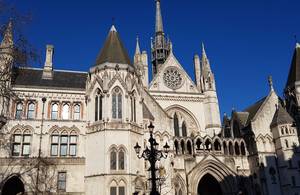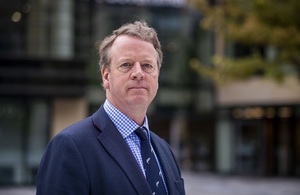- plug-in van and truck grants extended for 2 years as government goes further and faster to decarbonise transport
- drivers with standard licences can continue driving electric goods vans at a higher weight limit, making it easier for businesses to make the switch
- comes ahead of 2030 phase-out of new petrol and diesel cars and vans as part of net zero commitment
Businesses will be supported to make the switch to electric as the government commits to a 2-year extension of plug-in van and truck grants.
The move is expected to support the purchase of tens of thousands of greener vans and trucks, and will help make the UK less reliant on imports of foreign oil, improving the security of our energy supply and reducing our vulnerability to volatility in global energy prices.
Last year, industry figures showed the UK had the highest number of plug-in electric vans sold in Europe and there were around 4 times as many grant applications compared to 2020.
Existing grants have supported the purchase of more than 26,000 electric vans and heavy goods vehicles (HGVs) across the UK since the programme launched in 2012.
With nearly 5% of the UK’s CO2 emissions currently coming from vans, the 2-year extension to these grants and the switch to greener vehicles is essential to support the government’s climate change and air quality commitments.
Transport Minister Trudy Harrison said:
When it comes to clean business, this government means business. We are backing a generation of green growth for our thriving fleet sector.
As demand for electric vehicles continues to grow at speed, this extension to our grant scheme will allow tens of thousands more vans to be purchased, transporting goods in a way which is kinder to our environment. This will support our vital, ongoing work to clean up our air in towns and cities right across the country and build back greener.
Government grants for electric vans and trucks has helped kickstart the market, which now offers more than 30 models of electric vans and trucks which qualify for such schemes.
Electric vehicles are becoming more popular and affordable, and the number of available models will continue to rise, allowing more people and businesses to benefit from the lower running costs of greener vehicles.
This government has committed £2.5 billion to vehicle grants and chargepoint infrastructure to support the transition to zero emission vehicles to date, and plug-in vehicle grant schemes have supported the purchase of over 450,000 ultra-low emission vehicles across the UK – including more than 300,000 zero emission vehicles.
As well as the extension to grant schemes, the government has also announced it will continue to allow drivers holding standard car driving licences to drive electric goods vans at a higher weight limit, up to 4.25 tonnes (compared to a 3.5 tonne limit for diesel vans).
This takes into account the additional weight of electric vehicle batteries and makes it easier for businesses and drivers to make the switch.
To ensure funding and taxpayers’ money goes where it’s really needed and supports the transition to zero emission vehicles, eligibility criteria for existing plug-in vehicle grants will also be recategorised from the spring with a focus on heavier vehicles.
From 1 April 2022, the threshold to claim the small truck grant of up to £16,000 will be increased from 3.5 tonnes to 4.25 tonnes. Vans up to 4.25 tonnes will be able to claim the large van grant of up to £5,000.
With the increasing number of large vans on the market, the move will ensure government targets support where it’s most needed, allowing for heavier and more costly trucks, up to 12 tonnes, to benefit from the higher grant funding.
This change will ensure funding is focused on helping more polluting trucks to make the switch to a zero-emission future.

